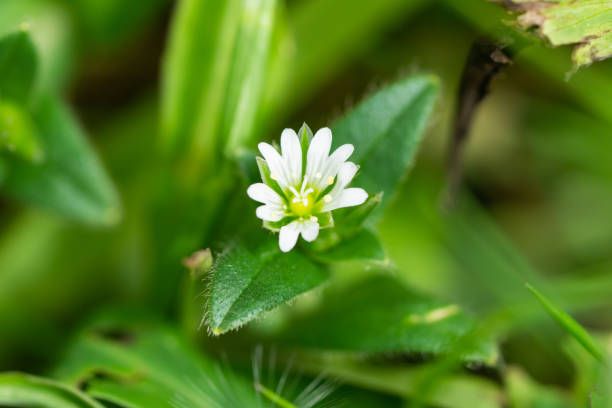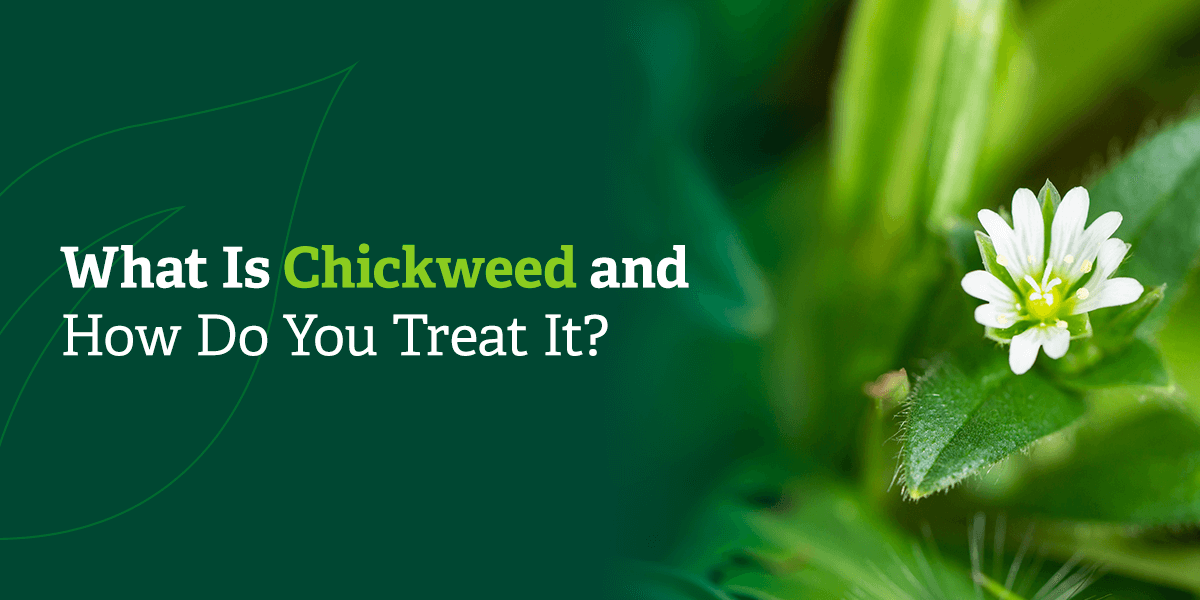

If you’ve stepped outside in America during late winter or early spring, there’s a good chance you’ve come across chickweed. This invasive weed is one of the biggest nuisances lawn owners and gardeners face each year. It germinates and spreads so fast, chickweed could infest your lawn before you realize it. It brings along with it unwanted pests, so it’s important to know how to get rid of chickweed.
Chickweed grass is an invasive species in North America, with the scientific name Stellaria media. It’s a member of the plant family Caryophyllaceae. It immigrated to America along with European settlers and began to spread throughout the continent, where it became one of the most common weeds on American lawns.
This weed is an annual plant with seeds that germinate from January to March. It can survive in a range of conditions — its adaptability is one of the reasons it spreads so well. As its name suggests, chickweed is a grazing food for chickens and other birds. It’s edible for many animals, including humans, though eating too much can cause side effects in some. Chickweed is problematic for homeowners, as it takes over lawns and gardens and creates a haven for insects and plant viruses.
Because chickweed is so widespread, you’ll find it has many different names depending on where you are or who you ask. Throughout the country, chickweed has earned many nicknames, such as:
The invasive weed takes over entire lawns if given the chance — it produces many seeds in a short span of time. Its seed production continues for weeks or months, beginning just a few weeks after its germination. Chickweed grows outward, forming a dense horizontal mat along the ground with its short root system formed beneath. Once it starts spreading, it’s challenging to stop. When it comes to chickweed, prevention is better than extermination.
Chickweed identification is straightforward, thanks to the plant’s distinct appearance. Chickweed has broad leaves and small white flowers. Its long leaves form a teardrop shape, coming to a point at the end. Most of the time, the plant grows no taller than 2 inches, but it can reach 4 or 6 inches if it has access to shade and space. Its little white flowers have five petals, divided in half to look like 10 petals.
Another variety of chickweed, known as sticky chickweed, has a slight variation in appearance. It grows a bit more upright, and its stems are hairy. Some of the hairs leave behind glandular secretions, giving it a sticky feel and earning it its nickname.
The best way to keep chickweed out of your lawn is to prevent it from growing in the first place. And the best way to prevent chickweed is by maintaining a healthy lawn, ideally with professional lawn care services. A thick lawn of grass and desirable plants will leave little room for chickweed to grow. You can take several steps to promote lawn health.
To keep your lawn as healthy as possible, you should implement each of the following strategies:
Though preventing chickweed growth is the best path, chickweed is a resilient and adaptable plant. It might pop up despite your best efforts. If you’ve found your lawn infested, you’ll need to know how to eliminate chickweed.
You can remove chickweed by hand. If you choose to remove it by hand, be sure to pull out the entire plant and root. Then bag up and dispose of all plant parts, as they can re-root if left on the soil. Manual chickweed removal can be tricky. You have to be diligent, removing all remnants of the plant to ensure it does not grow back. Professional lawn care service providers will know how to remove chickweed correctly and save you the hassle.
You can also kill chickweed with standard broadleaf weed killers. Keep in mind, treating your lawn with herbicides can have negative environmental impacts. Herbicides can also be dangerous if not applied correctly for the plants and animals you do want on your lawn. It’s better to err on the side of caution and seek a professional, organic weed control service.
Maintaining a healthy, beautiful lawn can feel like a challenging task, especially when a fast-spreading invasive weed comes into the picture. Chickweed is tough to prevent and eliminate, but keeping after it will ensure your lawn stays in the best possible condition. If you’re interested in keeping your lawn clean and weed-free, choose OrganicLawns.
At OrganicLawns, we offer personalized, comprehensive lawn treatment. We’ll use soil testing methods to create the best nutrient solution for your property. We can help you achieve a fuller, thicker, weed-free lawn — and we do it all using ecologically friendly methods, safe for kids and pets. To learn more or request a free lawn estimate, contact us at OrganicLawns today.